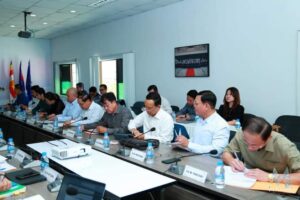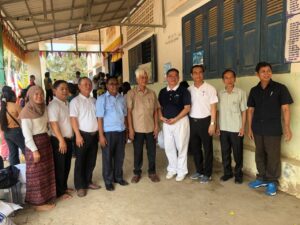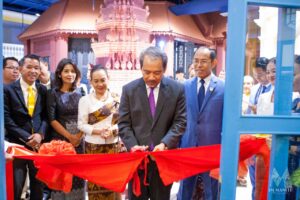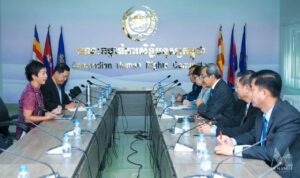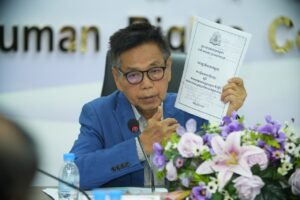Dissemination Workshop “Concluding Observations of the Second Periodic Report of Cambodia on the Implementation of the International Covenant on Economic, Social and Cultural [Rights]”
![Dissemination Workshop “Concluding Observations of the Second Periodic Report of Cambodia on the Implementation of the International Covenant on Economic, Social and Cultural [Rights]”](https://chrc.gov.kh/wp-content/uploads/2023/11/20.jpg) Dissemination Workshop “Concluding Observations of the Second Periodic Report of Cambodia on the Implementation of the International Covenant on Economic, Social and Cultural [Rights]”
Dissemination Workshop “Concluding Observations of the Second Periodic Report of Cambodia on the Implementation of the International Covenant on Economic, Social and Cultural [Rights]”
On the morning of Monday, 30 October 2023, His Excellency Keo Remy, Senior Minister, and President of the Cambodian Human Rights Committee (CHRC), presided over the Dissemination Workshop on “Concluding Observations of the Second Periodic Report of Cambodia on the Implementation of the International Covenant on Economic, Social and Cultural [Rights]” at the Raffles Royal Hotel. It was co-organised by the CHRC and the Office of the United Nations High Commissioner for Human Rights (OHCHR) in Cambodia, with a total of 104 participants from relevant ministries and institutions, and representatives of legislative institutions and civil society, development partners and embassies.
Its purpose is to bring together representatives of the Royal Government, civil society organisations and development partners in order to discuss the dissemination of the concluding observations and the role of monitoring the implementation of stakeholders’ recommendations, and at the same time, to share the plan for the implementation of the concluding observations from representatives of ministries and institutions as well.
Ms Roueida Adel El Hage, OHCHR representative to Cambodia, stated that the OHCHR supports States Parties, first, to fulfil their obligations for Economic, Social and Cultural Rights through macroeconomic and fiscal policies that support the implementation of these rights; second, to strengthen efforts to address inequality and discrimination against specific groups such as indigenous peoples, persons with disabilities, the elderly, women and girls, by enforcing laws, institutional policies and practices; third, to ensure a conducive environment through the network for meaningful and conclusive participation; and fourth, to work with international financial institutions so as to align macroeconomic policies and financial decisions with human rights.
His Excellency Keo Remy said that the Royal Government of Cambodia led by Samdech Prime Minister Hun Manet has guaranteed six priority policy programmes and addressed five priority challenges; [the former] includes (1) expanding healthcare services towards achieving the universal health coverage; (2) providing vocational and technical trainings for youth from poor and vulnerable households across the nation; (3) institutionalising the national social assistance programme for poor households, vulnerable people from poor households, and at-risk households during economic crises and emergencies; (4) formulating and accelerating the implementation of the Informal Economy Development Strategy to enable them to participate in the formal economy, and to grasp the benefits from formal social protection system; (5) introducing coordinating mechanism and financing programme that enhance agricultural products’ production, market access, and price stability at a reasonable level; and (6) deploying agricultural technical officers to all communes and Sangkats that have agricultural activities across the nation and forming farmers associations in rural areas.
He added that the Kingdom of Cambodia ratified the International Covenant on Economic, Social and Cultural Rights on 26 May 1992. Cambodia submitted its Second Periodic Report in September 2019, and the Committee reviewed it on 21-22 February 2023 and issued its concluding observations on 3 March 2023 for Cambodia to implement. The Kingdom of Cambodia is a leading country in the ASEAN region, ratifying and acceding eight out of the nine major international human rights treaties, as well as four optional protocols. In addition, Cambodia has continued to authorise the Office of the United Nations High Commissioner for Human Rights and the Special Rapporteur on Human Rights in Cambodia and always welcomes the Special Rapporteur’ visit on request. These major factors are the strong and incontrovertible evidence and testimony of the Royal Government of Cambodia’s true will to promote and protect human rights, under the wise and skilful leadership of Samdech Akka Moha Sena Padei Techo Hun Sen in the past and Samdech Hun Manet, Prime Minister of the Kingdom of Cambodia, which is justified by what we have seen.





















